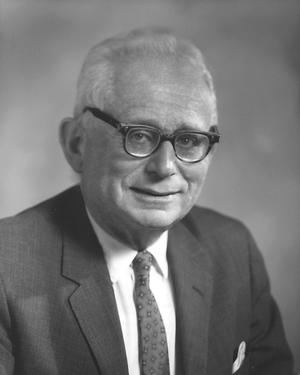DeWitt Stetten Jr.
American biochemist and administrator
DeWitt Stetten Jr. (1913–1990) was a prominent American biochemist and influential administrator in the field of medical research. He is best known for his contributions to the National Institutes of Health (NIH) and his role in advancing biomedical research in the United States.
Early Life and Education[edit | edit source]
DeWitt Stetten Jr. was born on September 30, 1913, in New York City. He was the son of DeWitt Stetten Sr., a noted physician, and his wife, who encouraged his early interest in science. Stetten attended Harvard University, where he earned his Bachelor of Arts degree in 1934. He continued his education at Columbia University, obtaining a M.D. in 1938 and a Ph.D. in biochemistry in 1940.
Career[edit | edit source]
Stetten began his career as a researcher at the Rockefeller Institute for Medical Research, where he worked on the metabolism of amino acids. During World War II, he served in the United States Army Medical Corps, contributing to research on malaria and other tropical diseases.
After the war, Stetten joined the faculty at Columbia University, where he continued his research in biochemistry. In 1954, he moved to the National Institutes of Health, where he played a pivotal role in the development of the NIH's research programs. Stetten served as the director of the National Institute of Arthritis and Metabolic Diseases from 1962 to 1970.
Contributions to Medical Research[edit | edit source]
Stetten's research focused on the metabolism of amino acids and the biochemical pathways involved in disease. He was instrumental in the discovery of several key metabolic processes and contributed to the understanding of genetic disorders related to metabolism.
As an administrator, Stetten was known for his ability to foster collaboration among scientists and for his commitment to supporting young researchers. He was a strong advocate for the expansion of the NIH and played a key role in the establishment of new research institutes within the organization.
Later Life and Legacy[edit | edit source]
In 1974, Stetten became the deputy director for science at the NIH, a position he held until his retirement in 1981. After retiring, he continued to be active in the scientific community, serving on various advisory boards and committees.
Stetten passed away on August 28, 1990, leaving behind a legacy of significant contributions to the field of biochemistry and medical research. In his honor, the NIH established the DeWitt Stetten Jr. Museum of Medical Research, which showcases the history of biomedical research and the achievements of NIH scientists.
Related Pages[edit | edit source]
Search WikiMD
Ad.Tired of being Overweight? Try W8MD's physician weight loss program.
Semaglutide (Ozempic / Wegovy and Tirzepatide (Mounjaro / Zepbound) available.
Advertise on WikiMD
|
WikiMD's Wellness Encyclopedia |
| Let Food Be Thy Medicine Medicine Thy Food - Hippocrates |
Translate this page: - East Asian
中文,
日本,
한국어,
South Asian
हिन्दी,
தமிழ்,
తెలుగు,
Urdu,
ಕನ್ನಡ,
Southeast Asian
Indonesian,
Vietnamese,
Thai,
မြန်မာဘာသာ,
বাংলা
European
español,
Deutsch,
français,
Greek,
português do Brasil,
polski,
română,
русский,
Nederlands,
norsk,
svenska,
suomi,
Italian
Middle Eastern & African
عربى,
Turkish,
Persian,
Hebrew,
Afrikaans,
isiZulu,
Kiswahili,
Other
Bulgarian,
Hungarian,
Czech,
Swedish,
മലയാളം,
मराठी,
ਪੰਜਾਬੀ,
ગુજરાતી,
Portuguese,
Ukrainian
Medical Disclaimer: WikiMD is not a substitute for professional medical advice. The information on WikiMD is provided as an information resource only, may be incorrect, outdated or misleading, and is not to be used or relied on for any diagnostic or treatment purposes. Please consult your health care provider before making any healthcare decisions or for guidance about a specific medical condition. WikiMD expressly disclaims responsibility, and shall have no liability, for any damages, loss, injury, or liability whatsoever suffered as a result of your reliance on the information contained in this site. By visiting this site you agree to the foregoing terms and conditions, which may from time to time be changed or supplemented by WikiMD. If you do not agree to the foregoing terms and conditions, you should not enter or use this site. See full disclaimer.
Credits:Most images are courtesy of Wikimedia commons, and templates, categories Wikipedia, licensed under CC BY SA or similar.
Contributors: Prab R. Tumpati, MD

